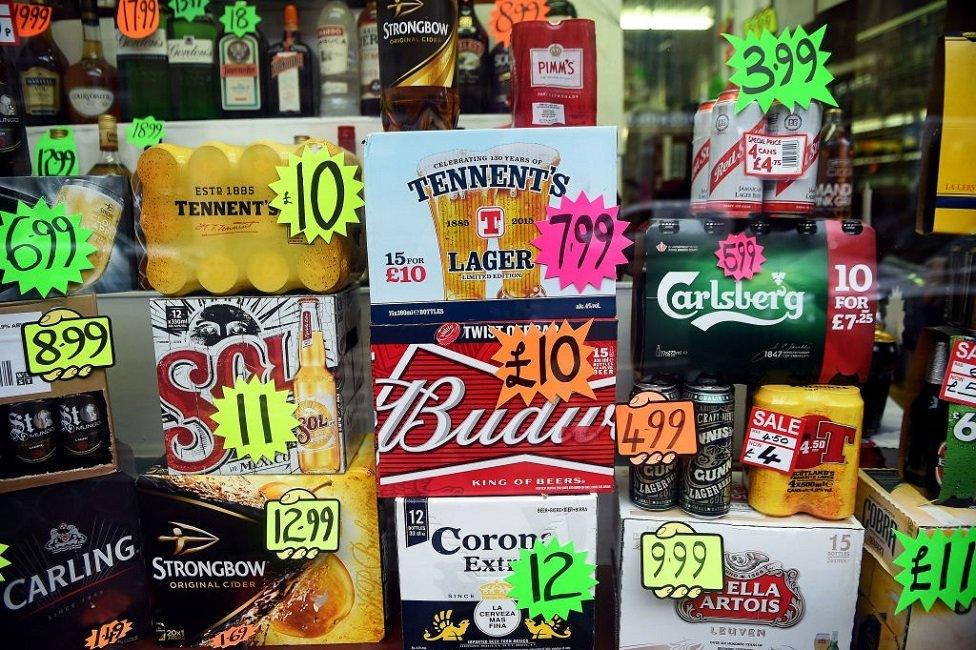Call for law change to strengthen labelling of alcohol
- Published

Campaigners say the drinks industry's voluntary agreement with government to include safe consumption limits on labels is not , but campaigner
Health experts and charities have called on the UK and Scottish government to act on "inadequate" labelling of alcohol products.
The Alcohol Health Alliance (AHA) said food product labels provide consumer information such as ingredients, nutritional values and health risks.
Only alcohol volume, bottle size and allergens must appear on drinks labels.
It said current regulations mean there is more information on a bottle of milk than on a bottle of wine.
AHA, whose members include medical royal colleges and charities, campaigns for policies to reduce alcohol-related harm.
It examined labels on 424 alcohol products in shops across the UK to see whether they provided up-to-date Chief Medical Officer's low-risk weekly guidelines and other essential information to allow consumers to make informed choices about their purchases.
The guidelines suggest a maximum weekly intake of 14 units of alcohol for both men and women.
But its report "Drinking in the Dark," said a voluntary approach adopted between the UK government and the drinks industry in 2016 had resulted in poor and inconsistent practice.
It found:
Labels on more than 70% of the bottles examined did not carry the information on safe drinking limits
Nearly a quarter (24%) of labels surveyed contained misleading, out-of-date health information, such as the old UK drinking guidelines or those from other countries
Health information was often illegible, with the average height of text displaying information about alcohol units measuring 2mm - well under the 3.5mm required to be easily readable
'Woefully inadequate'
Prof Sir Ian Gilmore, AHA chairman, said alcohol labelling was woefully inadequate and not fit for purpose.
He said: "It is time that health labelling is required for all products. The public must be granted the power to make informed decisions about their health by having access to prominent health warnings and information on ingredients, nutrition and alcohol content at the point of purchase.
"The industry's reluctance to include this information on their products suggests profits are being put ahead of people's health."
The report criticised the Portman Group, an industry-funded think tank which styles itself as the alcohol industry's "social responsibility body" saying only 2% of bottles produced by its members included the correct low-risk drinking guidelines.
However the group's chief executive John Timothy described the report as "utter nonsense".
"Take just one of our Portman Group members, Heineken, who represents well over a quarter of the UK's beer and cider market," he said.
"They already carry full CMO guidance on over 60% of their products and they will have completed the process by the end of the year.
"Our members are leaders in the industry, ensuring that for over 30 years that the sector is responsible and in that time have seen significant declines in alcohol consumption, youth drinking, drink-driving and alcohol-related crime."
'Failure' to regulate
A Canadian study published in May 2020, external found alcohol warning labels, like those on cigarette packets, were effective tools in helping drinkers make informed decisions.
It found consumers exposed to the labels were 10% more likely to know about the link between alcohol and cancer and three times more likely to be aware of the low-risk drinking guidelines.
Alison Douglas, chief executive of Alcohol Focus Scotland, said alcohol producers continue "to show a complete disregard for our right to know what is in our drinks and what the risks associated with alcohol consumption are".
She said: "Their on-going failure to provide full and accurate information is simply unacceptable. We need reliable health information directly on bottles, cans and menus, where it can usefully inform our decisions."
The industry has demonstrated that it won't do this voluntarily, Ms Douglas said, adding: "We have even seen new products come onto the market in recent months that don't provide the Chief Medical Officers' low risk guidelines three years on.
"The UK government has consistently failed to regulate. It is now time for Scottish government to use its powers to set out labelling requirements for alcoholic products in law."
The Scottish government committed in its 2018 Alcohol Framework, external to consider legal changes if alcohol producers did not include the low-risk drinking guidelines on products by the UK government's deadline of September 2019.
A Scottish government spokeswoman said: "This new evidence provides us with important new data and we will consider its findings carefully.
"The Scottish government is determined to reduce the harm caused by alcohol and we are considering if further measures might be necessary to ensure more producers make this information available on drinks containers."